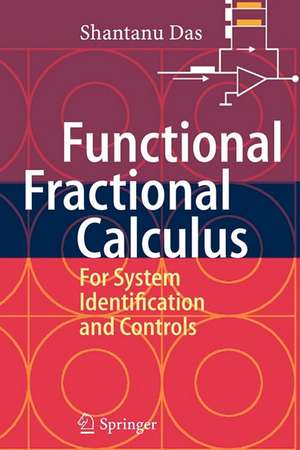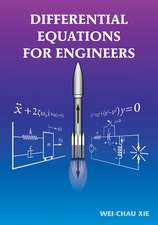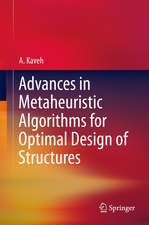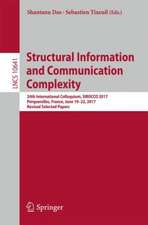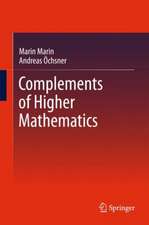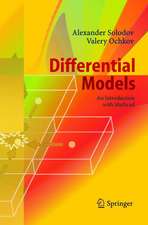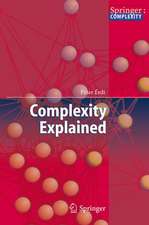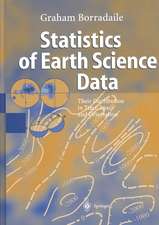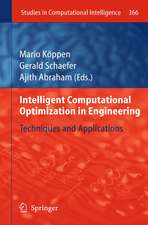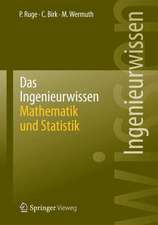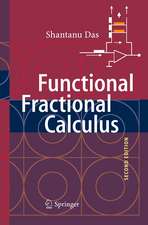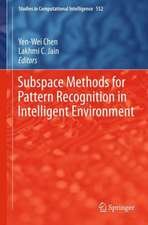Functional Fractional Calculus for System Identification and Controls
Autor Shantanu Dasen Limba Engleză Paperback – 15 oct 2010
Preț: 882.92 lei
Preț vechi: 1076.73 lei
-18% Nou
Puncte Express: 1324
Preț estimativ în valută:
168.97€ • 175.75$ • 139.49£
168.97€ • 175.75$ • 139.49£
Carte tipărită la comandă
Livrare economică 14-28 aprilie
Preluare comenzi: 021 569.72.76
Specificații
ISBN-13: 9783642091780
ISBN-10: 3642091784
Pagini: 260
Ilustrații: XVIII, 240 p. 68 illus.
Dimensiuni: 155 x 235 x 14 mm
Greutate: 0.37 kg
Ediția:Softcover reprint of hardcover 1st ed. 2008
Editura: Springer Berlin, Heidelberg
Colecția Springer
Locul publicării:Berlin, Heidelberg, Germany
ISBN-10: 3642091784
Pagini: 260
Ilustrații: XVIII, 240 p. 68 illus.
Dimensiuni: 155 x 235 x 14 mm
Greutate: 0.37 kg
Ediția:Softcover reprint of hardcover 1st ed. 2008
Editura: Springer Berlin, Heidelberg
Colecția Springer
Locul publicării:Berlin, Heidelberg, Germany
Public țintă
ResearchCuprins
to Fractional Calculus.- Functions Used in Fractional Calculus.- Observation of Fractional Calculus in Physical System Description.- Concept of Fractional Divergence and Fractional Curl.- Fractional Differintegrations: Insight Concepts.- Initialized Differintegrals and Generalized Calculus.- Generalized Laplace Transform for Fractional Differintegrals.- Application of Generalized Fractional Calculus in Electrical Circuit Analysis.- Application of Generalized Fractional Calculus in Other Science and Engineering Fields.- System Order Identification and Control.
Recenzii
From the reviews:
"The book under review, entitled ‘Functional fractional calculus for system identification and controls’, which is organized into ten chapters, appears to be fairly inspiring for those who are engaged in varied applications of the fractional calculus. The chapters comprising the book are, according to the author’s intention, made as application oriented from various science and engineering fields." (P. K. Banerji, Zentralblatt MATH, Vol. 1154, 2009)
“This book introduces fractional calculus to researchers and practicing engineers by giving an applications-oriented treatment of the subject.” (IEEE Control Systems Magazine, Vol. 29, October, 2009)
"The book under review, entitled ‘Functional fractional calculus for system identification and controls’, which is organized into ten chapters, appears to be fairly inspiring for those who are engaged in varied applications of the fractional calculus. The chapters comprising the book are, according to the author’s intention, made as application oriented from various science and engineering fields." (P. K. Banerji, Zentralblatt MATH, Vol. 1154, 2009)
“This book introduces fractional calculus to researchers and practicing engineers by giving an applications-oriented treatment of the subject.” (IEEE Control Systems Magazine, Vol. 29, October, 2009)
Textul de pe ultima copertă
When a new extraordinary and outstanding theory is stated, it has to face criticism and skepticism, because it is beyond the usual concept. The fractional calculus though not new, was not discussed or developed for a long time, particularly for lack of its applications to real life problems. It is extraordinary because it does not deal with ‘ordinary’ differential calculus. It is outstanding because it can now be applied to situations where existing theories fail to give satisfactory results. In this book not only mathematical abstractions are discussed in a lucid manner, but also several practical applications are given particularly for system identification, description and then efficient controls.
Historically, Sir Issac Newton and Gottfried Wihelm Leibniz independently discovered calculus in the middle of the 17th century. In recognition to this remarkable discovery, J. Von. Neumann remarked, "…the calculus was the first achievement of modern mathematics and it is difficult to overestimate its importance. I think it defines more equivocally than anything else the inception of modern mathematical analysis which is logical development, still constitute the greatest technical advance in exact thinking."
The XXI century will thus have ‘exact thinking’ for advancement in technology by growing application of fractional calculus, and this century will speak the language which nature understand the best.
Historically, Sir Issac Newton and Gottfried Wihelm Leibniz independently discovered calculus in the middle of the 17th century. In recognition to this remarkable discovery, J. Von. Neumann remarked, "…the calculus was the first achievement of modern mathematics and it is difficult to overestimate its importance. I think it defines more equivocally than anything else the inception of modern mathematical analysis which is logical development, still constitute the greatest technical advance in exact thinking."
The XXI century will thus have ‘exact thinking’ for advancement in technology by growing application of fractional calculus, and this century will speak the language which nature understand the best.
Caracteristici
Staringt point for research in applicatiosn of fractional calculus The reader gets a feeling of the wide applicabilityof fractional calculus in the field of science and engineering Written for a wide range of readers, who wish to learn the basic concepts of Fractional Calculus and its Applications A starter can understand the concepts of this emerging field with a minimal effort and basic mathematics
